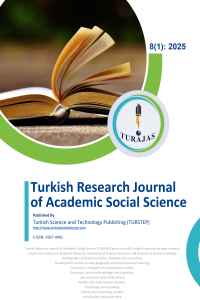Political Violence or Religious Supremacy Contest? The Option of Inter-Religious Dialogue for Peaceful Coexistence in Nigeria
Öz
Nigeria is not only the most populous black African country, it is also a perfect example of a pluralist society. It is both multi-ethnic and multi-religious in its make up. This has made it prone to violence of different dimensions. Though no society is free from violence, violence is never a wanted phenomenon. Due to the huge size of Nigerian population, violence always has devastatingly damaging effects on its general political structure and its social fabrics. Like many other countries, Nigeria has witnessed plethora of ethnic, religious, political, and even occupational violence. However, this study focuses on political violence in the country. It features Inter Religious Dialogue (IRD) prominently in its analysis since political violence in Nigeria is often triggered by religious bigotry. Its data are primarily and secondarily sourced. Theoretically, this study employs Gordon Allport’s Contact Hypothesis which argues that positive inter-group contact helps reduce prejudice and promotes positive relations between groups. This is complemented by the combined utilization of the Qur’anic concepts of Tasamuh (tolerance) and Sulh (peacemaking). Findings of this study reveal that political violence do have religious undertones and are majorly caused by deliberate provocations and supremacy contest (among others) among the adherents of the two primary religions. It concludes that peaceful coexistence between Christians and Muslims is achievable via IRD and can thus help curb and avert political violence. It recommends regular friendly dialogue among leaders across religious divides as this will hopefully create harmonious environment particularly during electioneering in election periods.
Anahtar Kelimeler
Prejudice Politics Religious Dialogue Violence Supremacy Contest
Ayrıntılar
| Birincil Dil | İngilizce |
|---|---|
| Konular | Siyaset Bilimi (Diğer) |
| Bölüm | Research Article |
| Yazarlar | |
| Erken Görünüm Tarihi | 4 Temmuz 2025 |
| Yayımlanma Tarihi | 30 Haziran 2025 |
| Gönderilme Tarihi | 24 Mart 2024 |
| Kabul Tarihi | 5 Ocak 2025 |
| Yayımlandığı Sayı | Yıl 2025 Cilt: 8 Sayı: 1 |
ISSN: 2667-4491
Bu ürün Creative Commons Attribution 4.0 tarafından lisanslanmıştır.
Türk Akademik Sosyal Bilimler Araştırma Dergisi (TURAJAS) aşağıda verilen Alan Endeksleri tarafından taranmaktadır;

